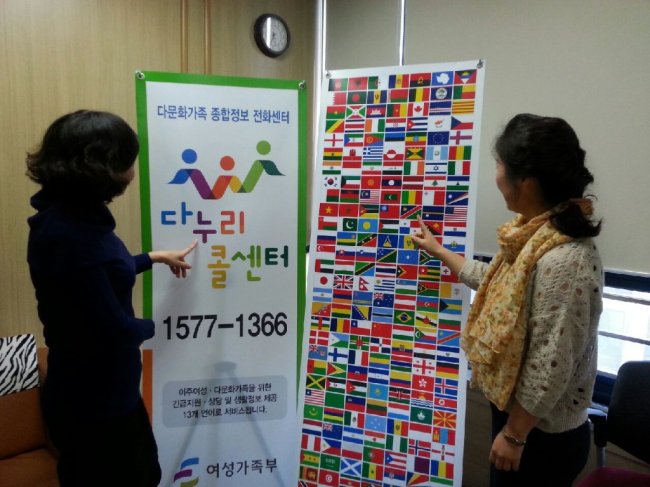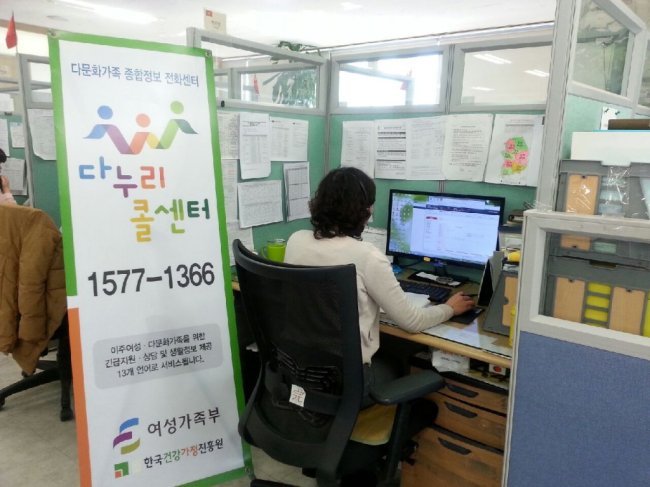[HERALD INTERVIEW] Sharing experience, wisdom with female migrants
By Claire LeePublished : March 21, 2016 - 16:38
When Do Thanh Quy gave birth to her first child 17 years ago in South Korea, she was made to eat “miyeokguk” by her Korean in-laws.
The Korean seaweed soup is traditionally served on birthdays and to women who have just given birth. The Vietnamese-born worker married her Korean husband in 1998, after spending four years as a factory worker. “I couldn’t bear the smell of the soup, especially just a few hours after delivery,” Do said in an interview with The Korea Herald.
After spending more than 20 years in South Korea, Do has now become used to the soup and speaks Korean fluently. She even secured a job at a government-affiliated agency here. Yet, one of the few things she regrets is not teaching her children her mother tongue, Vietnamese, when they were young.
The Korean seaweed soup is traditionally served on birthdays and to women who have just given birth. The Vietnamese-born worker married her Korean husband in 1998, after spending four years as a factory worker. “I couldn’t bear the smell of the soup, especially just a few hours after delivery,” Do said in an interview with The Korea Herald.
After spending more than 20 years in South Korea, Do has now become used to the soup and speaks Korean fluently. She even secured a job at a government-affiliated agency here. Yet, one of the few things she regrets is not teaching her children her mother tongue, Vietnamese, when they were young.

“My in-laws were against it, as they thought learning Vietnamese first would make it difficult for the kids to learn Korean properly,” she said.
“I was also scared that they may not fit in at school if I speak Vietnamese to them at home. Now I know that I was totally wrong. Vietnamese, if they had a chance to master it properly, would’ve been one of the biggest assets of my children.”
Her personal experience is part of the reason why Do applied to work at the state-run Danuri Helpline -- a hotline for female marriage immigrants in the country -- back in 2006. The 44-year-old is currently one of 85 phone counsellors for the hotline, which offers services in 13 languages including Vietnamese, Chinese, and Tagalog.
Most of the counselors at the agency are foreign-born migrant wives. They take calls from women from their countries of origin. For Do, the job enables her to tell other women not to repeat her mistakes. Most of the hotline callers, some 38.5 percent of them, are wives from Vietnam.
“I always tell women from Vietnam that they should start talking to their babies in Vietnamese when they are in the womb,” she said. “I always tell them their chance to communicate with their children in their mother tongue is something they should never give up.”
Her colleague, Kim Soo-yeon, moved to Korea in 2004 upon marrying her Korean husband. Born to ethnic Koreans in China, she spoke Korean fluently on top of Chinese before arriving in the country. However, getting used to Korean food was just as hard for Kim as it was for Do.
“Food was actually one of the biggest causes of conflicts between my husband and me in our earlier years (together), so I know how hard it can be for women who have just arrived here,” Kim said, adding she still dislikes bulgogi, one of Korea’s signature dishes.
“I still struggle with cooking (when making Korean dishes), but my husband only wants our kids to eat Korean food. So imagine what it would be like for women from Mongolia, most of whom have never eaten seafood before moving here.”
Although South Korea officially implemented bilingual policies for children of multicultural families in 2011, both Kim and Do said many migrant women still face forced assimilation by their in-laws and their Korean spouses. And this affects their children, too, they added. “Many women constantly hear the phrase, ‘when in Rome, do as the Romans do’ from their Korean husbands,” said Lee.
According to Kim, many ethnic Korean women from China are forced by their Korean spouses to get rid of their Chinese accent when speaking Korean. They are even asked to pretend that they were born and raised here.
“A lot of these husbands feel ashamed that they couldn’t manage to marry South Korean women,” Kim said. “As ethnic Korean women from China speak Korean fluently, and look ‘local,’ they think it’s possible to make them look like South Koreans as long as they get rid of their accent.”
Working at the Danuri Helpline means getting all kinds of calls, including Korean husbands requesting for simple translations: “Could you please tell my wife that we are going to a hospital at 9 a.m.?” There was once even an urgent call from an obstetrician in a delivery room: “Can you please tell my patient to push when we count to three?”

Kim and Do also get many calls from Korean husbands who often complain about their marriages. Do said a large number of such husbands complained that their Vietnamese-born wives were trying to wire too much of their salaries to their parents back home.
“I think it is one of the biggest misunderstandings Korean husbands have of Vietnamese women,” she said. “First, they need to understand that in Vietnam, daughters are just as obligated to support their parents as sons. We consider it our basic duty. And often, what women want is not the money, but words of understanding.”
Kim, on the other hand, often hears many husbands saying, “Are all women from China this stubborn?”
“In China, most of the mothers work. Full-time housewives are very rare,” Lee said. “There, women are used to expressing their opinion. And that trait is somehow interpreted as being ‘stubborn’ by Korean husbands here.”
Both Kim and Do said South Korean families are much more patriarchal than in their home countries. Do remembers being shocked when she had just arrived in the country and learned how Korean housewives spend their time at home. “The women are so devoted. They would clean the house, shop for groceries, and make dinner before their husbands get home,” she said. “I was shocked at how Korean husbands wouldn’t participate in domestic affairs after work, and yet they were somehow getting such superb treatment from their wives.”
Kim and Do said that more Korean relatives of migrant families should be educated on the unique challenges immigrants face, especially on food, language and even clothing. Do said she once mistakenly wore a piece of lingerie in public thinking it was a dress.
“You would be surprised at how many international couples fight about the clothes the women wear,” the women said. “Some women from warm countries get scolded by their in-laws and husbands for wearing too many layers in the winter months. Some women get scolded for choosing colors that are favored by people in her home countries.”
When asked to give advice to women in China who are thinking of moving to Korea, Kim said it’s important to gather as much information as possible first before making a decision. “Please don’t decide to move here after watching Korean dramas,” she said. “Don’t assume your problems at home will disappear once you move to another country.”
Migrant women who need help can call the Danuri Hotline anytime at 1577-1366. The hotline is available round-the-clock, 365 days a year. South Korean and Foreign-born counselors offer services in 13 different languages: Korean, Japanese, Chinese, Vietnamese, Tagalog, Russian, Thai, Mongolian, Lao, Uzbek, Nepali, Khmer and English.
By Claire Lee (dyc@heraldcorp.com)





![[From the Scene] Monks, Buddhists hail return of remains of Buddhas](http://res.heraldm.com/phpwas/restmb_idxmake.php?idx=644&simg=/content/image/2024/04/19/20240419050617_0.jpg&u=20240419175937)





![[Graphic News] French bulldog most popular breed in US, Maltese most popular in Korea](http://res.heraldm.com/phpwas/restmb_idxmake.php?idx=644&simg=/content/image/2024/04/18/20240418050864_0.gif&u=)


![[From the Scene] Monks, Buddhists hail return of remains of Buddhas](http://res.heraldm.com/phpwas/restmb_idxmake.php?idx=652&simg=/content/image/2024/04/19/20240419050617_0.jpg&u=20240419175937)

![[KH Explains] Hyundai's full hybrid edge to pay off amid slow transition to pure EVs](http://res.heraldm.com/phpwas/restmb_idxmake.php?idx=652&simg=/content/image/2024/04/18/20240418050645_0.jpg&u=20240419100350)

![[Today’s K-pop] Illit drops debut single remix](http://res.heraldm.com/phpwas/restmb_idxmake.php?idx=642&simg=/content/image/2024/04/19/20240419050612_0.jpg&u=)